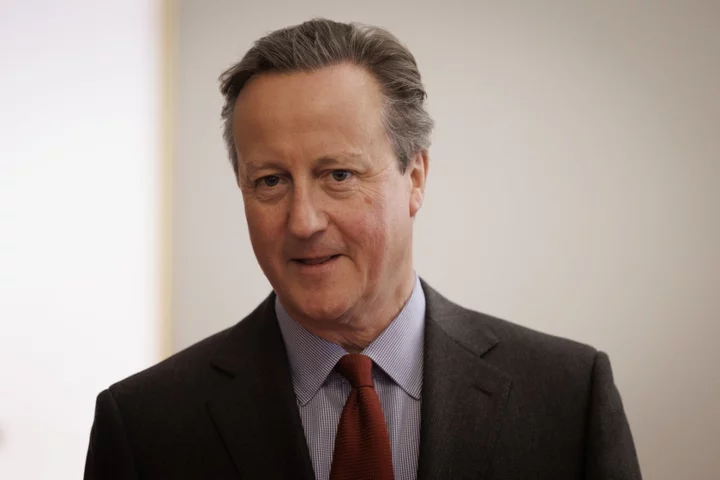
David Cameron wants post-Brexit Gibraltar deal with Spain ‘as soon as possible’
The UK and Spain are close to agreeing a deal on the post-Brexit status of Gibraltar, the Spanish foreign minister has indicated. A spokesperson for the Foreign Office said Lord Cameron had underlined the UK’s desire to get “a UK-EU treaty on Gibraltar as soon as possible” during his discussion with counterpart Jose Manuel Albares. Mr Albares first revealed he had been in crunch talks with Rishi Sunak’s new foreign secretary David Cameron on resolving the long-running row over trade and immigration arrangements. He told Spanish media that he had spoken with Lord Cameron over the phone on Monday, and they had also agreed to meet in person during a Brussels summit on Tuesday. The Spanish minister suggested the outline of a deal was now in place for a “zone of shared prosperity” in the Spanish area next to the British territory to avoid a hard border on the flow of people and goods. “I would sign a deal with Britain over Gibraltar tomorrow,” Mr Albares told the television channel Telecinco – saying both sides “agree that we have to move forward as soon as possible”. A UK-EU deal on arrangements for Gibraltar’s border – primarily on trade and free movement – was not struck in time for the Brexit deal worked out by Boris Johnson’s government. Conservative ministers have been nervous about signing any bilateral deal that could be viewed as reducing British influence over the territory. The Spanish foreign ministry has said the deal would allow Spain to use the Schengen agreement – which allows for the free movement of EU citizens around the bloc – to ease controls on the movement of people. Spain, the UK and the EU have previously agreed to the principle that Gibraltar should remain part of EU agreements on free movement. Mr Albares suggested the UK was also now keen on a frictionless border when it comes to the movement of goods – something akin to the thorny arrangements for Northern Ireland His ministry said a “zone of shared prosperity” deal would see limited checks “without increasing the risks for the EU internal market” – meaning the UK would have to agree to alignment on Brussels regulations. The Spanish foreign minister told reporters in Brussels: “I think this deal … is better for everyone than the application of European legislation after British citizens democratically decided to leave the European Union.” “There’s already been political will on the part of the Spanish government for many months,” Mr Albares said on the “generous and balanced deal on the table”. He added: “What’s needed now is that political will on the part of the United Kingdom to move forward decisively, which is what I’ve seen so far. But we won’t know until the end. Nothing will be agreed until it’s all agreed.” Despite optimism that a deal is now close, there was no word from Lord Cameron’s team on the prospects of an agreement being signed within days. Britain’s decision to leave the EU was very unpopular in the British overseas territory, where thousands of people cross the border with Spain every day for work. Just over 95 per cent of the territory’s population voted to stay in the EU in the 2016 referendum. The territory’s business leaders have been keen for a deal to be struck. Brian Reyes, editor of the Gibraltar Chronicle wrote: “Seven years on [from the Brexit referendum], the Brexit levanter still hangs over our heads.” Meanwhile, Lord Cameron is expected to try to meet EU Commission vice-president Maros Sefcovic during his Brussels summit visit – his first trip to the EU capital since his fateful Brexit referendum. The foreign secretary is reportedly ready to raise the issue of post-Brexit tariffs set to be imposed on the automobile industry into force in January if he meets Mr Sefcovic this week. Mr Sunak’s government is pushing the EU Commission to agree to delay the costly new “rules of origin” set to damage the electric vehicle (EV) market due to come in at the start of 2024 as part of Mr Johnson’s trade deal. The Independent has contacted Lord Cameron’s team and the Foreign Commonwealth and Development Office (FCDO) for comment. Read More ‘History and justice’ on side of Greek claim to Elgin Marbles, says minister Brexit red tape risks extending inflation crisis, retailers warn ‘Terrible legacy’ left by death of Bloody Sunday Parachute Regiment commander Hamas to release more hostages as thousands set for Gaza ceasefire march Lord Cameron says UK needs to engage with China Israeli safety depends on long-term Palestinian ‘security’, warns Cameron
1970-01-01 08:00
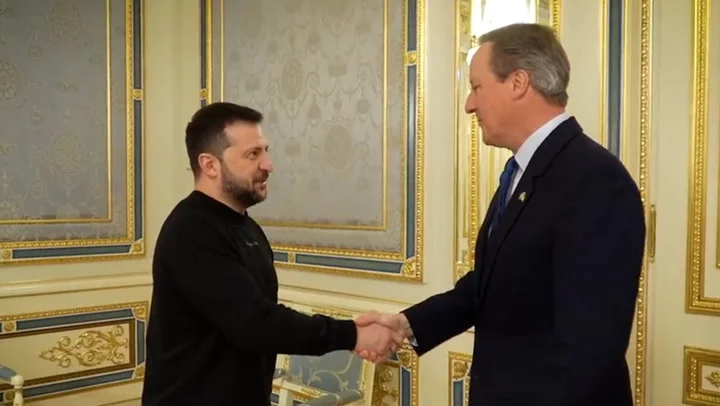
David Cameron meets Zelensky in Ukraine in first visit as foreign secretary – and praises Boris Johnson
David Cameron has visited Volodymyr Zelensky in Ukraine in his first overseas trip as foreign secretary. The former prime minister joked about his “disagreements” with Boris Johnson, but said support for the Ukrainian president was “the finest thing” his government did. And Lord Cameron promised Britain would maintain “moral, diplomatic, economic and military support” to the war-torn country “for however long it takes”. In a video of the meeting posted on X by president Zelensky, Lord Cameron said: “I had some disagreements with my friend Boris Johnson, and we have known each other for 40 years, and his support for you was the finest thing that he and his government did.” The newly appointed foreign secretary added: “I wanted this to be my first visit. Personally, I admire the strength and determination of the Ukrainian people. “And what I want to say by being here is we will continue to give you the moral support, the diplomatic support the economic support, but above all the military support, not just this year and next year, but for however long it takes.” Ukraine’s president said the pair discussed the supply of weapons for his forces fighting against the Russian invasion when they met in Kyiv. Mr Zelensky said: "We had a good meeting focused on weapons for the frontline, strengthening air defence, and protecting our people and critical infrastructure. "I am grateful to the UK for its support!" Former prime minister Lord Cameron became Foreign Secretary on Monday and the early visit to Ukraine will be intended to demonstrate the UK’s continued support for the country. His predecessor James Cleverly had been scheduled to make the visit before being moved to the Home Office in Monday’s reshuffle. Lord Cameron’s long-time rival and successor as PM Mr Johnson was a steadfast supporter of Ukraine, striking up a close relationship with president Zelensky after Russia’s invasion. It led a small town in southern Ukraine to rename one of its roads after him in recognition of the UK’s efforts to help the country in its war against Russia. Rishi Sunak has promised Britain will maintain its support for Ukraine, following in Mr Johnson’s footsteps. Read More British Foreign Secretary David Cameron meets Zelenskyy in first overseas visit as top UK diplomat David Cameron meets Zelensky as new foreign secretary makes first trip to Ukraine Cameron visits Ukraine in new role as Foreign Secretary SNP Westminster leader criticises ‘shameful’ vote against ceasefire in Gaza Has Rishi Sunak’s reshuffle changed the fate of his government? No 10 slaps down Braverman’s claim of secret deal with Sunak
1970-01-01 08:00
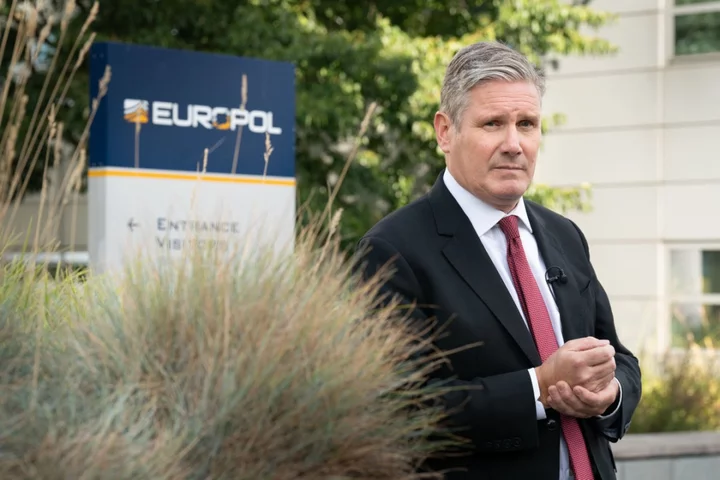
Starmer to meet Macron as experts say his Brexit deal bid looks ‘challenging’
Sir Keir Starmer will meet French president Emmanuel Macron as experts say he risks “demanding more than the EU is willing to give” with his insistence on seeking closer ties with Brussels. The Labour leader will hold talks in Paris on Tuesday, during which post-Brexit relations are expected to feature prominently, against a backdrop of debate over what any renegotiations with the bloc might involve. It comes as the UK in a Changing Europe (UKICE) research group publishes a new report that finds using the existing Trade and Cooperation Agreement (TCA) to reduce trade barriers will be “very challenging”. Sir Keir indicated in an interview with the Financial Times that he would seek to use a reassessment of the agreement in two years time to try to get “a much better deal” for the UK. The trade deal signed by Boris Johnson faces its first five-yearly review in 2025, though the extent of the talks are uncertain. UKICE says the onus will be on Britain to give the EU an incentive to shift its position, given the bloc is “relatively happy” with the existing partnership. Closer alignment on veterinary standards in order to ease trade, which Labour has cited as a priority, is highlighted in its report as one of the potential changes which would benefit the UK. But it adds that any new negotiations would potentially be lengthy and complex, and that time-consuming domestic issues like the economy and the NHS are likely to leave “limited bandwidth” for a major reassessment. Experts also warn that a review could even “inflame tensions” over implementation issues and that the EU is likely to prefer a lighter, technical re-evaluation. Anand Menon, director of UKICE, said: “Keir Starmer’s desire to secure a ‘much better’ Brexit deal for the UK is all well and good. “However, he failed to explain how tinkering with the Trade and Cooperation Agreement will make a meaningful economic difference. Moreover, he runs the risk of demanding more than the European Union is willing to give. “The UK is not a priority for the EU, which remains relatively happy with the TCA. The key for a Labour government will be figuring out a way to provide the EU with an incentive to restart negotiations over Brexit.” In its report, UKICE says Labour would need to set out a “much more detailed plan to demonstrate it is a serious negotiating partner with a realistic grasp of the issues at hand” and refine its “long list of ideas” into a more coherent set of goals. Sir Keir’s visit to Paris is the latest in a flurry of international engagements undertaken by Labour as the party seeks to raise its profile on the global stage ahead of a likely general election next year. Coinciding with his trip will be an appearance from shadow defence secretary John Healey in Washington DC, where he will make a speech calling on the US and UK to “work together” to defend democracy. Speaking at the American Enterprise Institute alongside Democratic Congressman Dean Phillips, Mr Healey will propose the countries jointly establish and lead a new “democratic resilience centre” to protect shared values and collectively monitor threats. The centre would be open to other Nato allies to join and could be a forerunner for a fully-fledged Nato body, he will say. Mr Healey and shadow foreign secretary David Lammy will meet officials from the White House, the US Department of Defence and the US Department of State during their visit. He will say: “For Labour, the US is the UK’s most essential ally, especially on defence and security. “Our countries should be on high alert ahead of the UK general election and US presidential election in 2024. This is the time to launch democratic resilience work together to better protect our democratic values and systems. “Democracy and freedom is hardwired into Nato’s founding treaties, alongside collective defence. Our deep conviction in democracy means we must also act to defend our democracies when under attack.” It comes amid a series of overseas engagements before party conference season, with Sir Keir having spent last week meeting fellow centre-left leaders in Montreal, Canada, including the country’s prime minister Justin Trudeau. That visit followed a trip to The Hague to hold talks with Europol officials on the shared challenge of people-smuggling gangs profiting from small boat crossings in the Channel. Read More UK Labour leader Keir Starmer says he'll seek closer ties with the EU if he wins the next election Sir Keir Starmer says he speaks to Barack Obama ‘frequently’ Starmer: Tory claims that Labour will join EU migrant quota scheme are ‘garbage’ Charity boss speaks out over ‘traumatic’ encounter with royal aide Ukraine war’s heaviest fight rages in east - follow live
1970-01-01 08:00
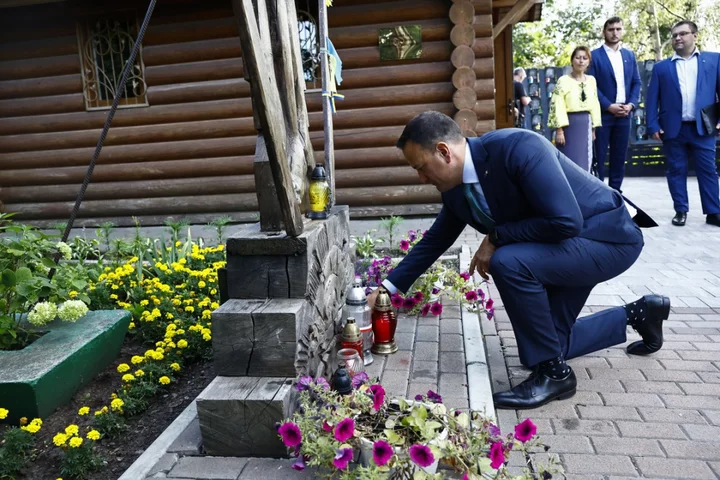
Ireland won’t offer condolences to Russia if Putin dies, Varadkar says
Taoiseach Leo Varadkar has said he does not think the Irish government would offer condolences to Russia in the event of Vladimir Putin’s death. Mr Varadkar was responding to a question relating to Ireland’s historical foreign policy. He said he did not believe an Irish delegation would be present at the Russian president’s funeral. The hypothetical situation relates to events almost 80 years ago. The Irish government adhered to a strict policy of neutrality throughout the Second World War. However, then-taoiseach and minister for external affairs Eamon de Valera sparked outrage among the international community when he expressed condolences to Germany’s Irish minister Eduard Hempel following Adolf Hitler’s death by suicide in 1945. The event caused significant reputational damage to Mr de Valera and the state, and is regarded as an important moment in the history of Irish neutrality. I wouldn’t imagine we’d be represented at the funeral Taoiseach Leo Varadkar The diplomatic conundrum was dragged into the 21st century this week at a post-Cabinet briefing with Mr Varadkar. While Ireland insists it continues to employ a policy of neutrality, senior government ministers say this relates to being militarily neutral rather than being politically neutral. Last week, Mr Varadkar pledged to stand with Ukraine for as long as it takes when he visited Ukrainian President Volodymyr Zelensky in Kyiv. He also announced millions of euro in additional funding for humanitarian aid to Ukraine. Following the trip, the taoiseach was questioned about Mr de Valera’s actions following the death of Hitler. Asked by reporters if Ireland would offer a similar condolence to Russia in the event of Mr Putin’s death, Mr Varadkar said: “I don’t think so.” Briefly pausing to consider the theoretical event, he added: “It’s a good question, I hadn’t thought of it before.” Mr Varadkar, who was banned from travelling to Russia last year, concluded: “I wouldn’t imagine we’d be represented at the funeral.” In November, the Kremlin said it was placing 52 “key representatives” from Ireland on a sanctions list for expressing what it claimed was Russophobic sentiment. Mr Varadkar was among the officials subjected to the ban by Russia. The Russian embassy in Dublin has been approached for comment. Read More Angry Russia refuses to speak at UN meeting on its attacks on Ukraine's key port city of Odesa. Putin ‘looked paralyzed and unable to act’ as Wagner coup unfolded Why are Wagner mercenaries in Belarus – and would they try to invade Poland? Charity boss speaks out over ‘traumatic’ encounter with royal aide Ukraine war’s heaviest fight rages in east - follow live
1970-01-01 08:00
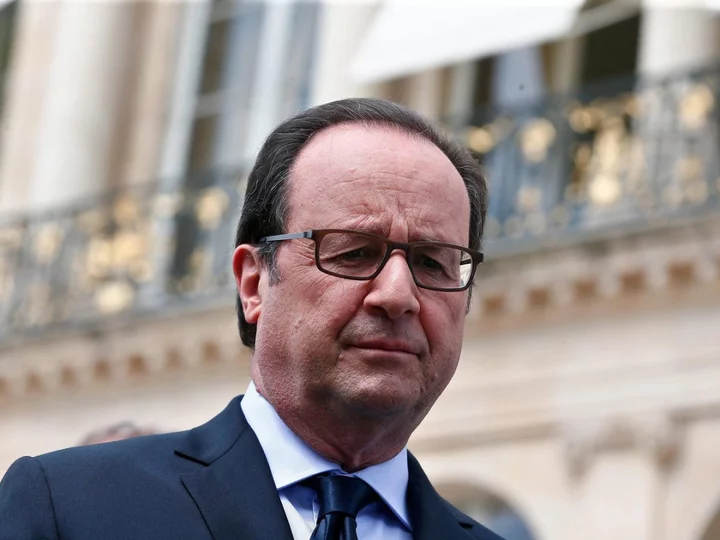
French riots could spread to UK, ex president François Hollande says
Britain and other European countries could be hit by riots on the scale France is currently experiencing, Francois Hollande has said. The former French president said the unrest, initially triggered by killing of Nahel Merzouk by a police officer, had been exacerbated by economic and social problems. Mr Hollande claimed the riots were in part spreading through a social media “domino effect" and that this would not respect borders. “Those people who sometimes look at us with a little irony should tell themselves that the same thing could happen there," he told the Times newspaper. "The images [of the riots] do not only circulate between Paris, Lyon and Marseilles, they also circulate in the towns and cities of the UK, Germany, the US.” The former Socialist Party head of state, held office from 2012 to 2017, said those taking to the streets had been motivated by "a desire to go and get goods that you cannot buy in ordinary times". He claimed in his analysis that some participants saw the protests as "an opportunity ... to break into shops and take everything inside". This urge had been exacerbated by inflation and Covid lockdowns which had caused social dysfunction among some French youth, he said. Nahel Merzouk, who was 17-years-old, was shot dead by a police officer during a traffic stop on Tuesday, triggering days of fierce clashes. More than 700 people were arrested following his funeral on Saturday as police fired tear gas and fought street battles with protestors late into the night in flashpoint Marseilles. Police initially reported that one officer had shot at the teenager because he was driving his car towards him. But this version of events was quickly contradicted by a video circulating on social media. London and other cities in England endured days of widespread rioting in 2011 following the shooting of 29-year-old Mark Duggan by police in Tottenham. Read More Fresh fears for house prices after fastest drop in 12 years Boris attacks ‘odious’ Ulez scheme – but Labour takes poll lead in Uxbridge Labour tells Jeremy Hunt his advisers must not undermine Bank of England Fresh fears for house prices after fastest drop in 12 years Boris attacks ‘odious’ Ulez scheme – but Labour takes poll lead in Uxbridge Labour tells Jeremy Hunt his advisers must not undermine Bank of England
1970-01-01 08:00
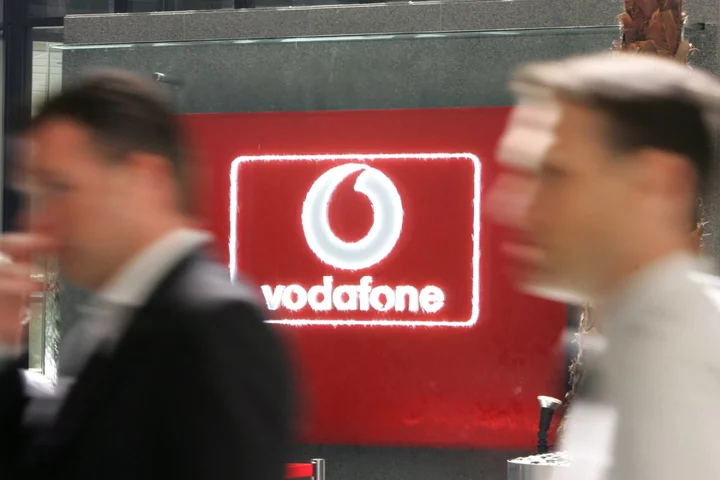
Former Tory leader warns Vodafone and Three merger poses ‘dangerous’ security risk
Former Tory leader Sir Iain Duncan Smith has warned the merger between Vodafone and Three is “dangerous” and risks giving a company with its roots in Communist Party-ruled China a more prominent place in the UK’s mobile network. The former work and pensions secretary and MP for Chingford and Woodford Green said the proposed deal raised serious questions about national security and competition within the UK telecommunications market. Vodafone and Three, both of which have millions of customers in the UK and Ireland, announced earlier this month that they were joining forces in a multibillion-pound deal they said would create one of Europe’s biggest 5G networks. “This is a dangerous deal, which it seems is yet another example of how the Communist Party is trying to create a Western dependency on China,” Sir Iain told The Independent. “Not only does it raise important questions about competition, but it poses risks to our communication networks and personal data.” Three is owned by CK Hutchison, a Hong Kong-listed conglomerate that has been accused of supporting repression in the former British territory, where thousands of residents fled after China’s implementation of a sweeping national security law used by authorities to crack down on dissent against the regime in Beijing. Sir Iain is among a number of cross-party MPs to raise concerns about the growing influence of China in the West, and in particular, telecoms companies who have their headquarters there and are operating in the UK. “The government still doesn’t seem to understand that Chinese companies can be mandated to hand over their data to Beijing at the drop of a hat,” Sir Iain said. “We should be really worried about that. I also think we need to be taking a closer look at who owns these companies, the links between them and the Chinese government and the origins of the money flowing through them.” Last autumn the government announced that Shenzen-based Huawei technology must be removed from the UK’s 5G public networks by the end of 2027, It followed advice from the National Cyber Security Centre and pressure from Washington, which banned equipment made by the company because it posed an “unacceptable risk” to US national security. In March, prime minister Rishi Sunak warned that China plans to “reshape the world” in plans that posed an era-defining challenge for the UK and its allies in the West but dismissed calls for Beijing to be categorised as a threat, something his predecessor Liz Truss pushed for. The union Unite, which has 1.4 million members, is also campaigning against the merger, which some analysts say could result in job losses and higher prices for consumers who are already being squeezed by the cost of living crisis. The deal has triggered an initial investigation by the Competition and Markets Authority and will be subject to approval under the new National Security and Investment Act. Gail Cartmail, Unite’s executive head of operations, said: “Instead of idly watching the CK Group cream profits from UK businesses, the government should ask if they are a suitable custodian of British assets.” Charlotte Nichols, the Labour MP for Wigan North who sits on the Department for Business and Trade sub-committee on national security, said: “Unite the Union has shared research with me that shows this merger would leave sensitive government contracts and the data of millions of UK consumers in the hands of Three, a company whose key leadership have supported repression in Hong Kong and worked hand-in-hand with the Chinese state for decades. “This will be dangerous deal for the UK and I fully support Unite’s campaign against it.” Other MPs – both Labour and Conservative – have tabled questions to government departments asking what security assessments ministers have made of the proposed merger deal. Both Three and Vodafone refused to comment but have previously dismissed concerns about security, saying that they work closely with security bureaus in what is a regulated industry. The Cabinet Office has said it welcomes foreign trade and investment “where it supports growth and jobs in the UK, meets our stringent legal and regulatory requirements, and does not compromise our national security. “However, we will not hesitate to use our powers to protect national security where we identify concerns.” Read More Vodafone and Three to merge in multibillion-pound deal Vodafone and Three merger: What the huge deal actually means for you Cleverly defends China visit plans and pledges to use UK’s global ‘influence’ Three and Vodafone are merging. Here’s what that means for your phone No one wants to take responsibility for No 10 ‘groper’ complaints, warns accuser Top Tories urge Rishi Sunak to use cabinet reshuffle to get a grip on warring party
1970-01-01 08:00
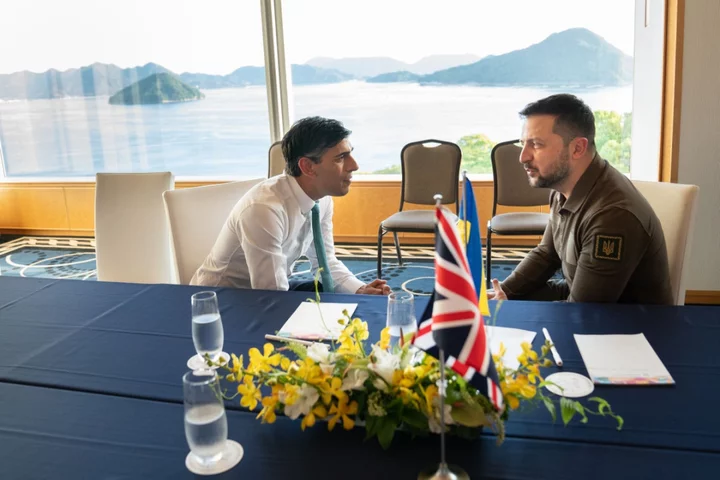
UK support for Ukraine will ‘never waver’, Rishi Sunak tells Zelensky
Britain’s support for Ukraine will “never waver”, Rishi Sunak has pledged after meeting Volodymyr Zelensky at the G7 summit in Hiroshima. The prime minister said he was glad the group of allies have agreed on the importance of providing the Ukrainian president with the advanced military equipment he needs as he pushes for F-16 fighter jets. Mr Zelensky will address the leaders of the major Western democracies during meetings on Sunday. He is on course to receive the boost of being donated advanced jets after US President Joe Biden authorised Western allies to transfer them to Kyiv. Mr Sunak updated Mr Zelensky on the “very positive progress” on fighter jets when they met in the Japanese city, Downing Street said. In a statement, Mr Sunak said: “The G7 was once the G8 – Russia was expelled in 2014 for its illegal annexation of Crimea and flagrant abuse of human rights and the rule of law. “Nine years on, it sends an incredibly powerful message to have my friend and Ukraine’s President Zelensky with us in Hiroshima today. “It tells the world that the G7 stands united with the people of Ukraine, in the face of a terrible onslaught. And it demonstrates that brute force and oppression will not triumph over freedom and sovereignty. “From providing Challenger tanks to long-range missiles and pilot training, the UK’s support for Ukraine’s defence will never waver. “I am delighted that the G7 has agreed on the importance of giving President Zelensky the advanced military equipment needed to win this war and prosper as a free and democratic nation.” The pair shared a warm informal meeting on Saturday after Mr Zelensky landed in Japan. “Good to see you,” the Prime Minister said, slapping him on the back after they greeted each other with an embrace. “You made it.” Asked by reporters if it was a good day for Ukraine, Mr Zelensky smiled, nodded and said “thank you so much”. Mr Zelensky tweeted: “Peace will become closer today.” G7 leaders vowed to support Ukraine for “as long as it takes” and to increase the costs to Russia and those who support its war. They also used their joint statement to be critical of China, saying they remain “seriously concerned” about the aggression shown towards Taiwan. Giving an account of Mr Sunak’s meeting with the Ukrainian leader, No 10 said: “The Prime Minister updated President Zelensky on the very positive progress at the G7 so far, including new sanctions against Russia and the provision of fighter jets. “The leaders looked forward to progressing talks with G7 countries and other partners on support for Ukraine and action against Russia’s destabilising and illegal behaviour.” Moscow warned that the “escalation” carries “enormous risks” for the countries involved. Russian deputy foreign minister Alexander Grushko told the Tass news agency: “We can see that Western countries continue to stick to an escalation scenario, which carries enormous risks for them. “In any case, we will take it into account when making plans. “We have all the necessary means to achieve our goals.” Mr Biden informed his allies at the conference in Hiroshima that he will give legal authorisation to allow the American-made planes to be donated to Kyiv. The US president, who is attending the G7 with other members France, Italy, Germany, Japan and Canada, as well as the EU, also announced training for Ukrainian pilots. The Prime Minister welcomed the decision, having pressed allies to provide the Ukrainian president with the jets he has been calling for. Mr Sunak tweeted: “Ukraine, we’re not going anywhere.” The RAF does not have any US-manufactured F-16s. Washington must legally approve their export. Mr Zelensky met India’s Narendra Modi on Saturday and will potentially come into contact with Brazil’s Luiz Inacio Lula da Silva. Both have not supported Ukraine like their Western allies. Neither are G7 members, but India is being represented at the summit because it is the current G20 chair, while Brazil has been invited as a guest. Mr Sunak will meet Mr Modi on Sunday before addressing the media at a press conference. Read More Russia warns of ‘colossal risks’ if F-16 fighter jets sent to Ukraine Vatican: Pope Francis tasks cardinal with mission aimed at paving 'paths to peace' in Ukraine Ukraine-Russia war – live: Kyiv denies Putin has taken Bakhmut but warns ‘situation is critical’ G7 allies to set up team to counter Russia and China’s use of economic coercion Charity boss speaks out over ‘traumatic’ encounter with royal aide Ukraine war’s heaviest fight rages in east - follow live
1970-01-01 08:00
